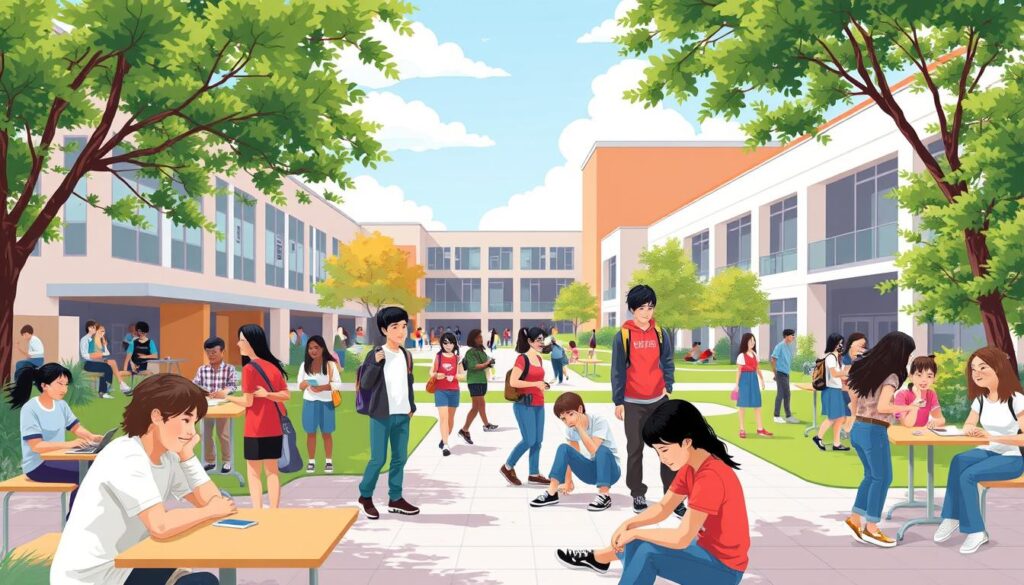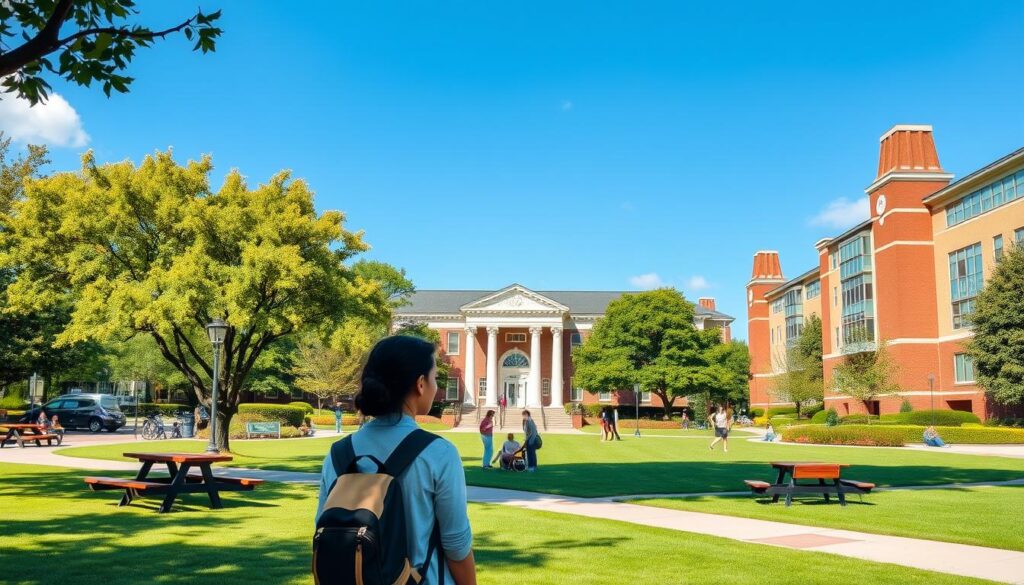More than 150 colleges across 42 states have launched programs for autistic students. These initiatives aim to bolster their academics, job readiness, and ability to live independently. When choosing a college, finding one that offers an inclusive and supportive setting is key for teenagers with autism.

It’s crucial to understand the differences between college programs. Close to seventy colleges have specialized autism support, costing around $3,500 each semester. But, it’s important to know many programs don’t qualify for federal financial aid. So, exploring options early is vital for families during this transition phase.
All colleges getting federal funds must make learning accessible for everyone. How do you know if a college’s support is good?
Colleges with specialized support are growing, as shown by statistics. While some students overlook necessary services, the ones who do engage see better outcomes.
Key Takeaways
- Choosing an inclusive and supportive college is essential for teenagers with autism.
- CTP programs offer a framework for academic and independent living skill development.
- Average costs and access to financial aid can greatly influence college selection.
- Accommodations are legally mandated but vary by institution.
- Asking the right questions about support programs is a crucial part of the process.
- Expert insight emphasizes preparation that aligns both educational and vocational aspirations.
- Active utilization of college support services can positively impact post-graduation outcomes.
Understanding the Spectrum of College Programs for Autism
Teenagers with autism have many options when they think about college. There are about 200,000 teenagers on the autism spectrum getting ready to leave high school in the next five years. It’s important to know about the different educational paths they can take. These include Career and Technical Education (CTE) programs and regular college degrees. Each path meets the unique needs of students, showing why education must be customized.
Transition and Postsecondary Options for Diverse Learners
Programs for teenagers with autism help them grow in many ways. They focus on academics, life skills, and getting ready for work. The Individuals With Disabilities Act (IDEA) offers education support until they’re 21 or 22, depending on where they live. But, moving to college or job programs needs planning from an early age.
This planning isn’t just about studying. It also includes learning how to manage money, stay clean, and interact with others.
Comparing CTP and Non-CTP College Programs
College options for autistic students differ a lot. Over 150 colleges in 42 states have Comprehensive Transition and Postsecondary (CTP) programs. These programs mix job training and college with a chance for federal student aid. This mix gives students a full educational experience.
But, non-CTP programs don’t usually get federal student aid. They often rely on money from public districts or job training agencies. That’s why it’s vital for families to look carefully at all choices.
Customized educational approaches and specialized support are key in making good decisions about school.
Navigating Federal Student Aid and Other Financial Resources
Money is a big worry for many autistic students thinking about college. Federal student aid is really helpful for those in approved CTP programs. It makes college possible for students who might not afford it otherwise. Also, some colleges have special scholarships for autistic students. They might also get help from state job training programs. This help can cover extra costs, sometimes around $3,500 every semester. Knowing about these money sources and how to get them is a big deal.
Choosing the best program for teenagers with autism means looking at classes, support, and money help. As more students with autism go to college, these special programs become more important. They help students do well in school and in life afterwards.
The Importance of Academic and Housing Accommodations

Choosing the right college matters for teens with autism. Academic adjustments and housing help are key to their success. Colleges get funds from the government. So, they must help students with disabilities. This makes autism support for teens not just nice to have, but a must.
When picking a college, see how they help with school and home needs. They might offer more test time or tech for learning. Changes in where you live can also help if things get too overwhelming.
- Extended testing time and modified assessment distribution help accommodate learning paces.
- Priority registration can alleviate the stress associated with course selection.
- Alternative seating and sensory breaks in classrooms support concentration and reduce anxiety.
- Personalized living arrangements ensure a living environment that caters to sensory sensitivities and social preferences.
Knowing about these helps is key for your family. Getting in touch with college disability services lets you see what help is there. It’s for students on the autism spectrum. This early effort helps you adjust to college, raising your chances of doing well.
This aid really makes a difference. For example, some students might struggle with tests in the usual spots. Taking tests in a quiet place helps focus, even if you can’t get questions answered right away.
Finally, talking to colleges about autism support for teens is vital. Knowing what reasonable accommodations are there helps a lot. This not only supports students but is key for students with autism to thrive in college.
Tailoring Your College Search: Essential Questions to Ask
Finding the best college matters a lot, especially with an autism diagnosis in adolescents. Planning early helps ease into college, especially when looking at autism resources for adolescents and various college disabilities support services.
When searching for a college, consider these important questions related to autism needs:
- Does the college offer sensory accommodations, like noise-reducing headphones in libraries or private areas for testing?
- How well does the college’s disabilities office communicate needed accommodations to faculty and staff?
- Are there housing options that reflect sensory needs and social comfort levels?
- What ongoing support for social skills and mental health is available? Look for mentorship programs or groups for students with autism.
- Can the college offer academic support that recognizes autism’s unique learning styles?
Given that only 38.8% of college students with ASD graduate, these support services are crucial. They help students manage college life. Programs like College Steps focus on academic, social, and job support crucial for decision-making.
Evaluated the services well. Question not just their presence but how effective they are. Try to speak with current students or alumni for real stories about the college disabilities support services.

Looking for a college where your needs are met with enthusiasm is key. It lays the path for both academic and personal success. Early research and asking the right questions are vital in planning a good college experience for teens with autism.
Conclusion
Starting college can be huge for any teen, especially for those with autism symptoms in teens. It’s a chance to mesh autism treatment for teenagers with learning and making friends. The goal is to have an inclusive college experience that supports and grows each student’s individual talents.
Every student’s needs are different. This is key to know for those working with autism in teens. It’s essential to see how a college meets their unique learning and growth needs. Colleges should have strong support systems, clear communication, and caring staff to help students thrive.
- Assessment of the environment for sensory sensitivities.
- Availability of tailored support services like counseling and occupational therapy.
- Programs targeting social skills and peer interaction.
It’s important for families to look into special resources for students. Places that focus on being inclusive can make getting an inclusive college experience easier.
Finding the right strategies is key. Evidence shows teens with autism need structured educational programs. These should cover academic basics, everyday social skills, and self-care. These elements are vital for teens with autism.
Being proactive in planning for college helps a lot. Use past experiences and new education strategies for autism to shape your choices. Look for programs that boost social skills, lower stress, and improve relationships for teens with autism.
In conclusion, picking the right college for teens with autism helps them do well in school and life. By doing this, families and advisors create a path to a rewarding and inclusive college experience.
How New Direction For Young Adults Can Help You
Standing at the edge of a big change, like going from high school to college, can feel daunting. Especially if you’re dealing with autism spectrum disorder (ASD). Every year, about 48,500 teens with autism turn 18. Sadly, 26% don’t get services to help them transition after high school. This is where New Direction for Young Adults comes in. They offer autism support programs to make your move towards college readiness smoother.
Young adults with ASD face bigger challenges when planning their future. They might struggle with new environments more than others. New Direction for Young Adults helps close this gap. They help you understand your strengths and work on being more flexible. This prepares you for college life. They also emphasize the importance of setting your own goals and being accountable.
Improving life skills like communication and speaking up for yourself is key. New Direction for Young Adults knows these might be tough for those with ASD. Their program makes sure you’re ready to interact with different people, like teachers and future employers. They support you in more than just school stuff. They help you learn to live on your own, manage health insurance, and understand social services. New Direction for Young Adults guides you through adult responsibilities. They help you explore college, vocational, and apprenticeship options that fit your journey.





